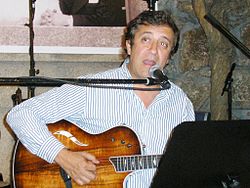Rui Veloso
Rui Veloso | |
|---|---|
 Rui Veloso in 2006, in Porto | |
| Background information | |
| Birth name | Rui Manuel Gaudêncio Veloso |
| Born | 30 July 1957 Lisbon, Portugal |
| Genres | Rock, blues, blues rock, pop rock |
| Instrument(s) | Vocals, guitar, piano, harmonica |
| Years active | 1979–present |
| Labels | |
| Website | ruiveloso |
Rui Manuel Gaudêncio Veloso CavIH (born 30 July 1957), known as Rui Veloso, is a Portuguese singer-songwriter and musician.
Commonly called "The father of Portuguese rock" (Portuguese: O pai do rock português),[1][2] Veloso was a major figure in the boom of Portuguese rock music in the 1980s. His debut album Ar de Rock (1980), including the hit single "Chico Fininho", is considered a landmark of Portuguese rock.[3] During the 1980s and 1990s, Veloso released numerous other successful singles and albums in Portugal.
An unconditional lover of blues music, he played with B.B. King several times in King's shows in Portugal.[4]
Early life
Rui Veloso was born in Lisbon on 30 July 1957. His father, Aureliano Veloso (25 February 1924 - 12 June 2019), was the first democratically elected mayor of Porto after the Carnation Revolution, in 1977.[5]
Veloso grew up in Porto and started to play harmonica at the age of 6.[6] In 1972, aged 15, he started to play guitar.[7] He began developing a passion for blues music from an early age, having Eric Clapton, Muddy Waters, B.B. King and Bob Dylan as references. In his youth, Veloso was part of the Magara Blues Band, singing songs in English and performing in bars and friends' houses.[6]
Veloso met Carlos Tê in 1976, with whom he would develop a successful songwriting partnership during his career.[7]
Musical career
1979-1989: Ar de Rock, Fora de Moda, Guardador de Margens and Rui Veloso
In 1979, Rui Veloso signed his first contract with Valentim de Carvalho. The following year, he was joined by the backup band A Banda Sonora, with Zé Nabo on bass and Ramon Galarza on drums, for the recording of his first album. In July 1980, Veloso's debut album Ar de Rock is released.
Ar de Rock and the single "Chico Fininho" became an immediate success in Portugal. According to Francisco Vasconcelos, executive manager at Valentim de Carvalho in the 1980s, "with Rui Veloso the politics went out and the social side entered the Portuguese pop music. With Rui Veloso we stopped listening and started feeling and dancing the music made in Portugal. The success of Ar de Rock happened because, in 1980, Portugal was a country that desperately wanted to change."[7] The success of the album is considered to have triggered a wave of pop-rock hits sung in Portuguese in Portugal during the 1980s.[8] In September 1980, Rui Veloso e a Banda Sonora were the opening act for The Police at the Estádio do Restelo.[9]
In 1982, Veloso released his second album, Fora de Moda. It was followed by Guardador de Margens in 1983 and Rui Veloso in 1986.
1990-1999: Mingos & Os Samurais, Auto de Pimenta, Lado Lunar and Avenidas
This section needs expansion. You can help by adding to it. (December 2020) |
2000-present: Espuma das Canções and Rui Veloso e Amigos
This section needs expansion. You can help by adding to it. (December 2020) |
Discography
Studio albums
- Ar de Rock (1980)
- Fora de Moda (1982)
- Guardador de Margens (1983)
- Rui Veloso (1986)
- Mingos & Os Samurais (1990)
- Auto da Pimenta (1991)
- Lado Lunar (1995)
- Avenidas (1998)
- A Espuma das Canções (2005)
- Rui Veloso e Amigos (2012)
Compilation albums
- O Melhor de Rui Veloso - 20 Anos Depois (2000)
- Essencial (2014)
- O Melhor de Rui Veloso (2015)
Live albums
- Ao Vivo (1998)
- O Concerto Acústico (2003)
- Ao Vivo no Pavilhão Atlântico (2009)
Video albums
- O Concerto Acústico (2003)
- Ao Vivo no Pavilhão Atlântico (2009)
References
- ^ Antena1, RTP, Rádio e Televisão de Portugal-. "Rui Veloso: "o pai do rock português" completa 60 anos - Os Dias da Rádio". Antena1 - RTP (in Portuguese). Retrieved 13 December 2020.
{{cite web}}: CS1 maint: multiple names: authors list (link) CS1 maint: numeric names: authors list (link) - ^ "Música para matar o vírus: dia #3 - Rui Veloso". www.sabado.pt (in European Portuguese). Retrieved 13 December 2020.
- ^ PÚBLICO. ""Blitz" elege os 25 melhores álbuns portugueses das últimas quatro décadas". PÚBLICO (in Portuguese). Retrieved 13 December 2020.
- ^ "BLITZ – "Como devem imaginar, estamos ambos muito nervosos". Quando B.B. King recebeu Rui Veloso em palco em 1990". Jornal blitz (in European Portuguese). Retrieved 13 December 2020.
- ^ "Morreu Aureliano Veloso, pai de Rui Veloso e primeiro presidente da Câmara do Porto - JN". www.jn.pt (in Portuguese). Retrieved 14 December 2020.
- ^ a b Infopédia. "Rui Veloso - Infopédia". Infopédia - Dicionários Porto Editora (in Portuguese). Retrieved 14 December 2020.
- ^ a b c "BLITZ – Há 40 anos, Rui Veloso estava quase a 'rebentar'. E o rock português nunca mais seria o mesmo". Jornal blitz (in European Portuguese). Retrieved 14 December 2020.
- ^ Paulos, Pedro. "O segredo que esconderam do Chico Fininho". Observador (in European Portuguese). Retrieved 14 December 2020.
- ^ "Grandes Concertos | Rui Veloso". www.uau.pt. Retrieved 14 December 2020.
External links
